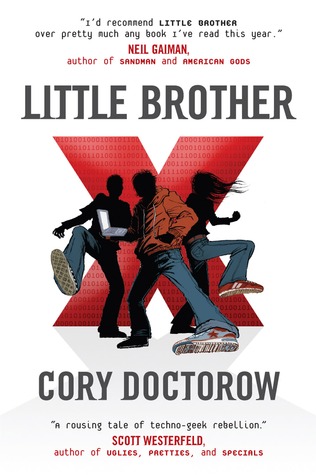 Title: Little Brother
Title: Little BrotherAuthor: Cory Doctrow
Series: Little Brother
Volume: 1
Genre: Speculative Fiction, Science Fiction, Cyberpunk
Release Date: April 28, 2009
Goodreads
A Quick Introduction: Marcus knows how to work the system- how to sneak passed the surveillance at school. He's smart and tech. savvy. He mostly uses his skills to sneak out of classes. But when he and his friends are caught in the aftermath of a terrorist attack on San Francisco, they are captured by the Department of Homeland Security and brutally interrogated for days. One of Marcus's friends, Darryl, is injured in the attack, and when the DHS releases Marcus and most of his crew, he isn't released. Even when they are released, they aren't free- the city has turned into a police state. Everyone is treated like a potential terrorist, and media is being cracked down on. Marcus knows that nobody would believe him if he told them what had happened, and takes matters into his own hands. If nobody will believe him, he'll have to fight the DHS himself.
Review at a Glance: A thought-provoking, technology-wise story of rebellion.
Review: We live in an internet age, but comparatively know very little about how it works. I have a mediocre knowledge at best (and yes, I feel the shame). So I learned a lot about the internet and security. I think that was something that was a really strong part of this book- it was informative, and that made it engaging for me. Though some of the more complicated security information was confusing, I still learned a lot. This was, for me, more of a thinking book than anything else for me.
Though that's not to say that the story didn't interest me- I did follow the plot, and enjoyed reading about Marcus's tale of rebellion, but it seemed to me to be more of a speculative and informative piece than one driven by plot. The plot itself was a relatively simple one, with all of the hacking and internet security info-dumps aside. Overall, I found it enjoyable enough, and quite exhilarating at times.
I had mixed feelings about the characters. I think that it would be too much to say that I liked them as people, but it wasn't that most of them were poorly written- it was just that I wasn't that fond of them. I didn't really like the protagonist per say. It wasn't that he was unrealistic, just that I wasn't smitten with him as a person, though he isn't without his good qualities. I didn't dislike him all the time, and I didn't like him all the time. I found that Angie felt fell into some character tropes that I'm not terribly fond of as well, but they both seemed very much to be teenagers, if that makes sense. I didn't really feel much of anything about their relationship, again, the story for me was more about the precautionary element of the controlling government. The views of the characters were quite "anti-adult" as one would say (or "anti-over-25" as the case may be), which I have never been fond of because a) I am aware that everyone will grow older and become "the enemy" which makes it a little limiting and b) I believe that each person should be taken on a case-by-case basis. This characteristic put me off a bit on occasion, but it fortunately wasn't too prevalent.
Overall, this book made me more aware of how utterly complicated the internet and technology in general can be, and the importance of freedom in a society that is both focused on security and surprisingly lax. It was certainly different in some ways from most books that I have read before. The greatest strength of this book was that it made me think.

No comments :
Post a Comment